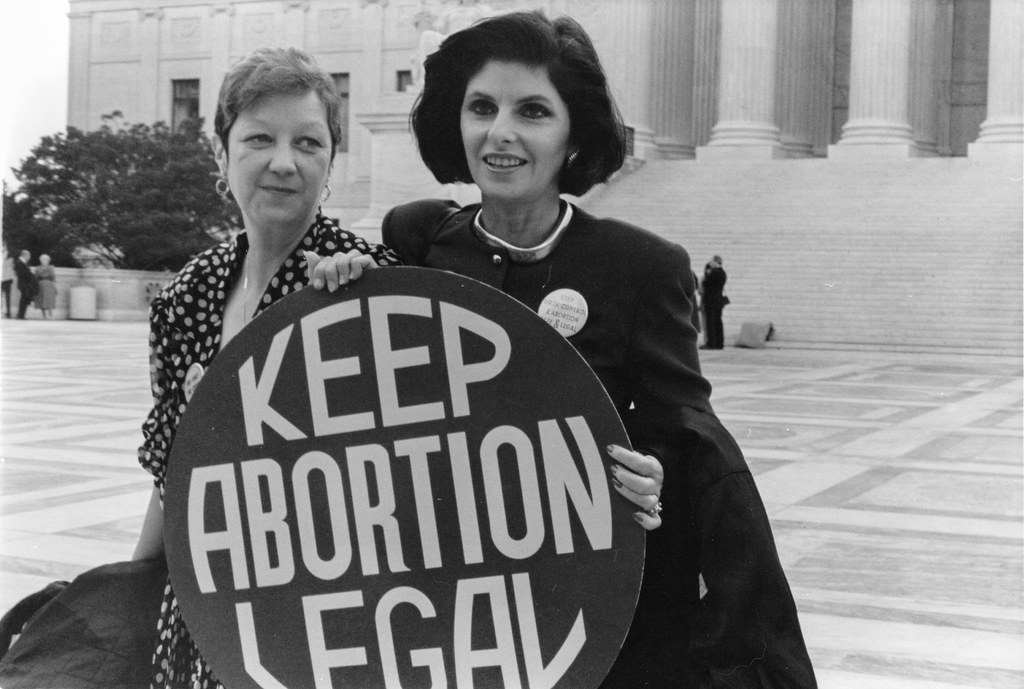by Carol Carpenter
for the “Progressive Views” column, Boerne Star, May 22, 2020

The 1973 Supreme Court case, Roe v Wade, is on the docket of the present term of our Supreme Court; and may be revisited in June via a ruling on Louisiana’s new abortion law. In Medical Services v Gee, an abortion clinic and physicians have mounted a challenge to Louisiana’s law requiring abortion physicians to have admitting hospital privileges within 30 miles of their clinic. This law is almost identical to a Texas law that was struck down by the Court in 2016. However, the ideological make-up of the court is different in 2020 than it was in 2016.
President Trump’s campaign promise to overturn Roe v Wade was significantly aided by an improper, if not unconstitutional, decision by the Senate. The Senate’s leader did not allow a vote on President Obama’s nominee to succeed Justice Antonin Scalia, who died during Obama’s last year in office. The vacancy on the Supreme Court was held open to provide President Trump the opportunity to fill the position with a nominee who would help the President fulfill his promise.
A poll on Roe v Wade taken in June 2019 showed that 77% of Americans want Roe v Wade upheld. Nevertheless, a majority of this number want “more restrictions added.” Fifteen years ago, a similar poll conducted by the San Antonio Express-News reported similar findings and a call for “some restrictions” on when abortions can be performed.
I found the call for restrictions on Roe v Wade so troubling I took a small, unscientific poll of family and friends. Regardless of their strong opinions, one way or the other, not a one had read Roe v Wade. And, I suspected they had not read the Constitution, either.
Article III of the Constitution gives the Supreme Court judicial power, not legislative power. Because they are not a law-making body, they could only judge the constitutionality of Roe and give broadly worded guidelines for the states to implement and enforce their own abortion laws. In spite of this, many who opposed the decision accused the court of “making law.”
In their deliberations on Roe v Wade, the justices studied medical and legal history and applied Constitutional law to their decision. In the process, they discovered that, historically, common law, Christian theology and canon law attached no penalty to abortions performed before “quickening.” That is the first recognizable movement of the fetus in utero, usually about 17 weeks of gestation. Because post-quickening abortion was never established as a common law crime and this body of law was not generally replaced in America until after the Civil War, Americans from Colonial times until 1865 did not view abortion with much disfavor. It was a common form of contraception throughout our early history.
With these findings in mind, Justices applied the “strict scrutiny test,” a standard of judicial review, in conjunction with the Constitution’s due process or “liberty” law of Article 14, to the 1973 attempt by Texas to overturn Roe v Wade. They found that the state could not demonstrate it had a compelling interest in the restriction of abortion in the first trimester. Therefore, Roe v Wade was upheld.
For a brief review of Roe v Wade: The justices divided gestation into trimesters.
In the first trimester, the abortion decision must be left to the medical judgment of the pregnant woman’s physician.
In the second trimester, the state, in promoting its interests in the health of the mother, may, if it chooses, regulate the abortion procedure in ways that are reasonably related to maternal health.
In the third trimester, when the fetal development is subsequent to viability, the state, in promoting its interest in the potentiality of human life, may, if it chooses, regulate and even deny abortion, except where necessary, in appropriate medical judgement, for the preservation of the life or health of the mother.
Instead of following these guidelines and establishing clinics where women can have safe, lawfully restricted or medically necessary abortions, states legislated undue burdens on women by closing clinics, criminalizing women and their abortion doctors, requiring unnecessary medical tests, and creating other onerous roadblocks.
It is vitally important for all of us to understand and come to terms with the fact that abortions will not cease with the overturning of Roe v Wade. What will change is that there will be no restrictions placed on any abortions if they are moved from safe, regulated clinics to the back alleys.



